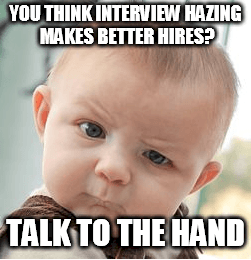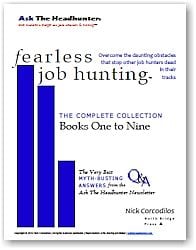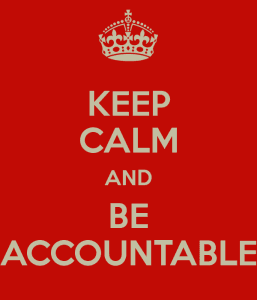In the February 9, 2016 Ask The Headhunter Newsletter, a reader asks whether it’s okay to threaten one employer with a job offer from another employer.
Question
I’m a recruiter and I want to address what happens when people are interviewing with multiple employers. I don’t think there’s anything wrong with letting an employer
know you’re interviewing at other companies. After all, employers acknowledge they’re interviewing more than one candidate. But I think it’s bad form to use one job offer to leverage another one.
If an offer is not what you want, just reject it after trying to negotiate a better one. But don’t threaten an employer with an offer from another employer. I had two employers pull job offers from candidates when the candidates played hardball during negotiations. They said they had other, better offers, hoping to get the employer to raise their bids. In both cases, of course, the candidates were stunned and disappointed the offers were pulled off the table. Lesson learned for them.
Do you agree?
Nick’s Reply
So, there are rules of engagement in interviews? (I know, I’m baiting you, but it’s friendly.) If there are any rules, it seems they’re all designed to benefit employers.
The double standard
I can’t think of one thing employers are expected to do out of respect for candidates.
- They waste applicants’ time with silly screening interviews by personnel jockeys. (How is it an HR person with no engineering expertise can judge whether a computer design engineer is worth interviewing?)
- They arrive late for interviews with impunity. (“We are very busy.”)
- They want urine samples.
- They leave applicants hanging for months after promising feedback “in a couple of weeks.”
- They demand private information — social security numbers and salary history — before even meeting the candidate!
A double standard has long been in place. It’s time to remove it. Job applicants are constantly and sternly warned by HR and “career experts” about what to wear, say, not say, how to act, and so on.
- “Don’t ask what the job pays.”
- “Don’t tell us you’ve got other opportunities.”
- “Don’t try to leverage a better salary.”
Think about it. Would you give your SSN to someone who asked you out on a date? Would you give them your home address, before the date? Would you agree to take a personality test before going to dinner? Of course not. Employers’ expectations are bizarre and self-serving. But there’s an intimidation factor at work: If you want to be considered for a job, learn to heel, learn to beg.
I don’t agree with you
If a job candidate believes using one employer to force another employer’s hand might work, by all means do it. You point out that employers interview lots of candidates. They often say, “We found some other very good candidates, so we’re not making a decision about you yet.”
How’s that statement any more legit than, “I’m talking to another excellent employer who is interested in hiring me, and we’re talking about a higher salary than you’ve suggested”?
On the other hand, if you don’t want to disclose that you’re talking to other employers (or who they are), then it’s also legit to decline to disclose even if you’re asked.

A job interview is a negotiation on all levels. Be honest, be polite and professional, and demonstrate integrity — but you’re not required to pull punches. (See Fearless Job Hunting, Book 8: Play Hardball After The Interview.)
If you think you can get more money by pointing out that another company has made you a better offer, then use that as leverage. Of course, be aware that you might not get a higher offer. (And please don’t confuse my advice about using one offer to leverage another with using a job offer to extort a higher salary from your current employer. See “Don’t use an offer to get a raise” in Naive young grad blows it.)
If the employer plays at being offended or appalled, move on to someone who is an adult and ready to negotiate. (See Only naive wusses are afraid to bring up money.)
Be realistic about negotiating
There is, of course, a difference between trying to leverage a better deal and threatening or offending someone. Negotiating requires tact and integrity, and it requires that you behave reasonably and realistically. Perhaps most important, you must demonstrate that what you’re suggesting will benefit both you and the employer. Never ask for more money just because you want it; show why you’re worth it. (See The Basics: The New Interview and The New Interview Instruction Book.)
As for those employers who pull offers because the candidates played hardball during negotiations, that’s the employers’ prerogative. It’s also up to candidates to decide whether those employers are worth working for. (Please note: I think pulling an offer during negotiations is very different from rescinding an offer that the applicant has agreed to accept. See Protect yourself from exploding job offers.)
Employers have a lot to lose by disrespecting job applicants. Pretending that salary doesn’t matter is just plain goofy — yet many employers act like it’s bad form to talk money before agreeing to a job interview. But, why would anyone agree to lengthy discussions if they don’t know whether the salary for the job is high enough to justify all the talking? It’s just not realistic, and employers don’t get a pass when they’re goofy.
Leverage if you want to
Telling an employer you’ve got a better deal elsewhere may not be inappropriate. Use your best judgment. There’s nothing inherently wrong in playing one option against another — employers do it every day when they interview candidates! It doesn’t make you bad or rude unless you behave badly or rudely. Money is a serious factor in doing business. Just ask the company’s CFO. It matters all the time. So, don’t let employers intimidate you into a corner. Think about your situation, and decide whether to use one employer to leverage a deal from another.
(For what it’s worth, I’ve seen employers end interviews when candidates admit they’re interviewing with other companies. That’s akin to dumping a date who says they’ve been on other dates. We’re dealing with naivete.)
For more about negotiating higher job offers successfully, see these sections of the PDF book Fearless Job Hunting, Book 9: Be The Master of Job Offers:
- Am I unwise to accept their first offer? (pp. 8-9)
- How to Say It: I accept, but I’d like more money (p. 9)
- The bird-in-the-hand rule of job offers (pp. 12-14)
- Juggling job offers (15-17)
How do you negotiate? Do you let employers impose a double standard? Are you intimidated by “employers’ rules” — or do you insist on candor in the negotiating process?
: :


 I just sent one, after talking to the top dog. I repeated that I am interested in the position and told him of my immediate schedule. More importantly, and motivated by your columns, I told him about some activity of a standards committee that might have a strategic impact on his operations. I said I would be joining the committee, ex officio, by contributing some research I was doing, and I also told him what my input would be if I were working for him.
I just sent one, after talking to the top dog. I repeated that I am interested in the position and told him of my immediate schedule. More importantly, and motivated by your columns, I told him about some activity of a standards committee that might have a strategic impact on his operations. I said I would be joining the committee, ex officio, by contributing some research I was doing, and I also told him what my input would be if I were working for him.

 Contrary to the title of this Q&A, you’re not really afraid your millennial daughter is making a career mistake. You’re just afraid that you’re afraid she is. So I give you credit for starting a candid discussion about this, and for giving your daughter a chance.
Contrary to the title of this Q&A, you’re not really afraid your millennial daughter is making a career mistake. You’re just afraid that you’re afraid she is. So I give you credit for starting a candid discussion about this, and for giving your daughter a chance. Question
Question What are your rules for working with headhunters? Have you been burned?
What are your rules for working with headhunters? Have you been burned? My skill set wasn’t developed by being average, and I will not accept anything average. I make my employer lots of money. I impact the bottom line and that will cost you.
My skill set wasn’t developed by being average, and I will not accept anything average. I make my employer lots of money. I impact the bottom line and that will cost you.






